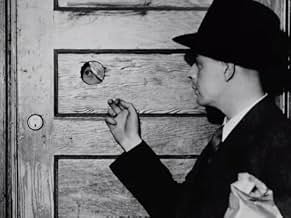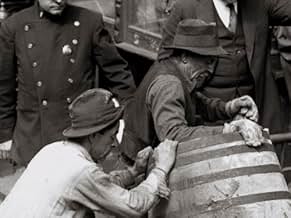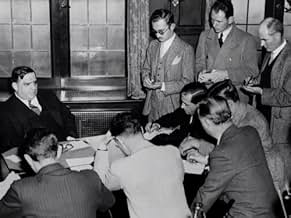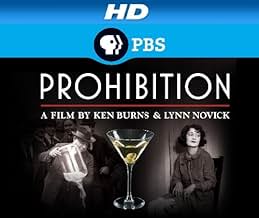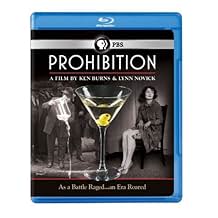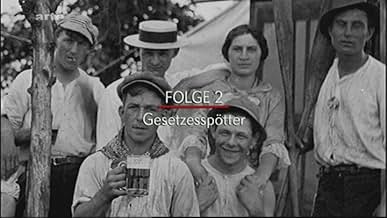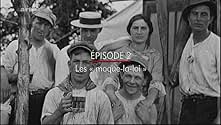IMDb RATING
8.2/10
3.5K
YOUR RATING
The story of the American activist struggle against the influence of alcohol, climaxing in the failed early 20th century nationwide era when it was banned.The story of the American activist struggle against the influence of alcohol, climaxing in the failed early 20th century nationwide era when it was banned.The story of the American activist struggle against the influence of alcohol, climaxing in the failed early 20th century nationwide era when it was banned.
- Won 1 Primetime Emmy
- 1 win & 3 nominations total
Browse episodes
Featured reviews
This is the latest documentary series from Ken Burns--the docu-god for Public Broadcasting. Not surprisingly, with his amazing reputation for perfection, he was able to once again get many of America's top actors to provide their voice talents to the shows--such as Tom Hanks, Sam Waterston and Blythe Danner. And, like so many PBS documentaries, Peter Coyote narrates more than capably.
The miniseries consists of three episodes. The first is about the background leading to Prohibition--the temperance movement and problems with alcohol over-consumption. It also ends with the implementation of the Constitutional Amendment. Part Two is about the practical aspects of the law. The difficulty in enforcement is due to a lack of widespread support, loopholes in the law as well as the way the law actually ENCOURAGED the growth of organized crime. Part Three is about the rising dislike of the law that led to its repeal.
Overall, it's yet another very good series by Ken Burn and is among the best shows you can find on the topic. Well worth your time--and it manages to make an educational show fun...of sorts.
The miniseries consists of three episodes. The first is about the background leading to Prohibition--the temperance movement and problems with alcohol over-consumption. It also ends with the implementation of the Constitutional Amendment. Part Two is about the practical aspects of the law. The difficulty in enforcement is due to a lack of widespread support, loopholes in the law as well as the way the law actually ENCOURAGED the growth of organized crime. Part Three is about the rising dislike of the law that led to its repeal.
Overall, it's yet another very good series by Ken Burn and is among the best shows you can find on the topic. Well worth your time--and it manages to make an educational show fun...of sorts.
10Calaboss
When it comes to making full coverage documentaries, you can't beat the work of Ken Burns. "Prohibition" is another fine illustration of that.
This five and one half hour mini-series, shown in three parts on PBS and available on DVD, never bogs down. That's pretty amazing right there. I would think it difficult to have that kind of running time and not have at least a couple spots where the story gets boring. It never does, and is a tribute to Ken's film making ability.
"Prohibition" describes how we got there, what it did to our country, and why the 18th Amendment, banning booze, became the only Amendment to be repealed. It was doomed to fail from the start, but nobody saw it at the beginning. It almost single-handedly brought about organized crime in America, a problem that has yet to be repealed.
Ken Burns covers it all very well, and his good name in these documentary efforts never fails to bring in the big names for voice-over work. In this case, Tom Hanks, Patricia Clarkson, Adam Arkin, Jeremy Irons, John Lithgow, etc., etc..
(Although it was never mentioned, I couldn't help but think of the parallels to modern day marijuana laws. When you have a product that millions of Americans want and you make it illegal, the money from that product goes to gangs that provide it, and with that, all the violence that goes along with those gangs. You can't legislate morality, as the 18th Amendment surely showed. And pot is much less harmful than alcohol.)
Another great job by Ken Burns.
This five and one half hour mini-series, shown in three parts on PBS and available on DVD, never bogs down. That's pretty amazing right there. I would think it difficult to have that kind of running time and not have at least a couple spots where the story gets boring. It never does, and is a tribute to Ken's film making ability.
"Prohibition" describes how we got there, what it did to our country, and why the 18th Amendment, banning booze, became the only Amendment to be repealed. It was doomed to fail from the start, but nobody saw it at the beginning. It almost single-handedly brought about organized crime in America, a problem that has yet to be repealed.
Ken Burns covers it all very well, and his good name in these documentary efforts never fails to bring in the big names for voice-over work. In this case, Tom Hanks, Patricia Clarkson, Adam Arkin, Jeremy Irons, John Lithgow, etc., etc..
(Although it was never mentioned, I couldn't help but think of the parallels to modern day marijuana laws. When you have a product that millions of Americans want and you make it illegal, the money from that product goes to gangs that provide it, and with that, all the violence that goes along with those gangs. You can't legislate morality, as the 18th Amendment surely showed. And pot is much less harmful than alcohol.)
Another great job by Ken Burns.
This is an excellent six-hour presentation. I knew a lot about the time. Or at least I thought so until this presentation. The details and pictures bring time and problems to life. Now we can see the problems of this day as a reflection of prohibition and its side effects.
A lot of information well presented gives you the fee that you lived through that time.
We have a strange collection of readers that you would never have guessed they would be: Patricia Clarkson John Lithgow Campbell Scott Sam Waterston
Includes the following episodes: "A Nation of Drunkards." "A Nation of Scofflaws." "A Nation of Hypocrites."
Narrator Peter Coyote Based on a book by Geoffrey C. Ward A PBS production.
A lot of information well presented gives you the fee that you lived through that time.
We have a strange collection of readers that you would never have guessed they would be: Patricia Clarkson John Lithgow Campbell Scott Sam Waterston
Includes the following episodes: "A Nation of Drunkards." "A Nation of Scofflaws." "A Nation of Hypocrites."
Narrator Peter Coyote Based on a book by Geoffrey C. Ward A PBS production.
My favorite comment in this documentary is offered by Pete Hamill, American journalist, novelist and essayist, who said basically if you want people to brush their teeth, pass a law banning toothpaste. And then people will do everything they can to acquire toothpaste illegally, and they'll brush their teeth just to spite the law. The unforeseen consequence of Prohibition is that once you take away a person's right to do something that people have always done, people will feel the desire to want it much more intensely, in the same way if you deny a child all sweets, the kid will be sneaking chocolate inside his jacket sleeves. Hamill later says he doesn't drink, but he would probably take a swig in front of a government building if the law ever forbade him from doing it. Encouraging moderation is not the same as banning something completely.
The other comment worth noting concerns repeal crusader Pauline Sabin who had been entrenched in republican politics prior to 1928. Republican congressmen would vote to adhere to the strictest of prohibition laws as laid out by the Volstead Act and then go to one of Sabin's parties demanding a drink. She concluded that the United States had become "a Nation of Hypocrites", which is the title of the third installment of Burn's documentary. Sabin becomes an unlikely hero who would sway the country against Prohibition and the eventual repeal of the 18th Amendment of the Constitution, the only amendment so dignified. Ironically, Daniel Okrent points out that today alcohol is somewhat harder to come by than during Prohibition because of liquor laws, underage drinking laws, etc. When alcohol was strictly forbidden, there was nothing in place to regulate it, except for raids on speakeasies and private distilleries.
Based in part on Daniel Okrent's "Last Call: The Rise and Fall of Prohibition", Ken Burns and Lynn Novick's "Prohibition" is a thoroughly entertaining, simultaneously humorous and "sobering" look at one of the strangest episodes in American legal history. The documentary is in three parts, the first chronicling the birth of the temperance movement which began in the 1820's almost a century before the ratification of the 18th Amendment. No question that alcohol was a problem for some people, mostly among the rural poor, but the temperance movement decided alcohol itself was the problem and vowed its eradication by the late 19th century. The first part ends with the ratification of the 18th Amendment to the US Constitution prohibiting not only the sale but importation of alcohol. Part two concerns the passage of the Volstead Act designed to enforce the amendment, and the immediate consequences of trying to stop people from drinking, and the antithetical results, such as lawlessness and bribery. The third and most sobering of the episodes chronicles many of the unintended consequences, such as the violence erupting in Chicago and the night club craze. The documentary ends with the movement for the repeal of the 18th Amendment.
The unforeseen catastrophes of the 18th Amendment which were designed to heighten American morality and assuage drunkenness turned America into one of the most alcoholic-driven nations among the industrialized world. Americans drank more booze, partied more, got more drunk, and flaunted the law more often during Prohibition than at any other time in the nation's history since after the Civil War, even as compared to the present time. Possibly only the 1960's are somewhat comparable to the mayhem of the 1920's.
The irony of ironies that the decade begun by the Temperance Movement's victory with the passage of the 18th Amendment to the US Constitution in 1919 would be nicknamed the Roarding Twenties and the Jazz Age. This was not a decade known for drinking milk. This was a decade characterized by cocktail glasses in the hands of flappers dancing on tables to the evocative music of Duke Ellington and Count Basie. Men would be raising giant mugs of frothy beer in underground establishments called speakeasies. Only Prohibition allowed the likes of Al Capone and Lucky Luciano to become wealthy gangsters, almost movie stars by today's standards. The leaders of the Temperance Movement, particularly the Woman's Christian Temperance Union and the Anti-Saloon League, were appalled when their daughters ran off to speakeasies and night clubs to partake of the forbidden fruit. Strangely, Prohibition helped usher in the Night Club culture of America which has continued unabated ever since. All the great night clubs famous for their booze, music, and dancing such as the Cotton Club and the Stork Club, were incepted when alcohol was supposed to be illegal.
For some reason, I didn't think Prohibition permeated into so many aspects of American life during its enforcement from 1920 through 1932. People could open small businesses in their basements and make a fortune through bootlegging, and then be hauled away under the Volstead Act. The rise of the Chicago Gang syndicate became a prototype for similar syndicates across the country, all vying for their bootlegging territory. At one point, citizens were legally compelled to snitch on neighbors suspected of bootlegging. The story as presented by Burns/Novick is as compelling as any action thriller being produced today. A great movie of American history, with all the elements that make a great story. Essentially it's a legal thriller with sex, violence, and lots of booze. Lots of it.
The other comment worth noting concerns repeal crusader Pauline Sabin who had been entrenched in republican politics prior to 1928. Republican congressmen would vote to adhere to the strictest of prohibition laws as laid out by the Volstead Act and then go to one of Sabin's parties demanding a drink. She concluded that the United States had become "a Nation of Hypocrites", which is the title of the third installment of Burn's documentary. Sabin becomes an unlikely hero who would sway the country against Prohibition and the eventual repeal of the 18th Amendment of the Constitution, the only amendment so dignified. Ironically, Daniel Okrent points out that today alcohol is somewhat harder to come by than during Prohibition because of liquor laws, underage drinking laws, etc. When alcohol was strictly forbidden, there was nothing in place to regulate it, except for raids on speakeasies and private distilleries.
Based in part on Daniel Okrent's "Last Call: The Rise and Fall of Prohibition", Ken Burns and Lynn Novick's "Prohibition" is a thoroughly entertaining, simultaneously humorous and "sobering" look at one of the strangest episodes in American legal history. The documentary is in three parts, the first chronicling the birth of the temperance movement which began in the 1820's almost a century before the ratification of the 18th Amendment. No question that alcohol was a problem for some people, mostly among the rural poor, but the temperance movement decided alcohol itself was the problem and vowed its eradication by the late 19th century. The first part ends with the ratification of the 18th Amendment to the US Constitution prohibiting not only the sale but importation of alcohol. Part two concerns the passage of the Volstead Act designed to enforce the amendment, and the immediate consequences of trying to stop people from drinking, and the antithetical results, such as lawlessness and bribery. The third and most sobering of the episodes chronicles many of the unintended consequences, such as the violence erupting in Chicago and the night club craze. The documentary ends with the movement for the repeal of the 18th Amendment.
The unforeseen catastrophes of the 18th Amendment which were designed to heighten American morality and assuage drunkenness turned America into one of the most alcoholic-driven nations among the industrialized world. Americans drank more booze, partied more, got more drunk, and flaunted the law more often during Prohibition than at any other time in the nation's history since after the Civil War, even as compared to the present time. Possibly only the 1960's are somewhat comparable to the mayhem of the 1920's.
The irony of ironies that the decade begun by the Temperance Movement's victory with the passage of the 18th Amendment to the US Constitution in 1919 would be nicknamed the Roarding Twenties and the Jazz Age. This was not a decade known for drinking milk. This was a decade characterized by cocktail glasses in the hands of flappers dancing on tables to the evocative music of Duke Ellington and Count Basie. Men would be raising giant mugs of frothy beer in underground establishments called speakeasies. Only Prohibition allowed the likes of Al Capone and Lucky Luciano to become wealthy gangsters, almost movie stars by today's standards. The leaders of the Temperance Movement, particularly the Woman's Christian Temperance Union and the Anti-Saloon League, were appalled when their daughters ran off to speakeasies and night clubs to partake of the forbidden fruit. Strangely, Prohibition helped usher in the Night Club culture of America which has continued unabated ever since. All the great night clubs famous for their booze, music, and dancing such as the Cotton Club and the Stork Club, were incepted when alcohol was supposed to be illegal.
For some reason, I didn't think Prohibition permeated into so many aspects of American life during its enforcement from 1920 through 1932. People could open small businesses in their basements and make a fortune through bootlegging, and then be hauled away under the Volstead Act. The rise of the Chicago Gang syndicate became a prototype for similar syndicates across the country, all vying for their bootlegging territory. At one point, citizens were legally compelled to snitch on neighbors suspected of bootlegging. The story as presented by Burns/Novick is as compelling as any action thriller being produced today. A great movie of American history, with all the elements that make a great story. Essentially it's a legal thriller with sex, violence, and lots of booze. Lots of it.
Daniel Okrent's "Last Call: The Rise and Fall of Prohibition" and Ken Burns and Lynn Novick's "Prohibition" mini-series were two similar projects that began together resulting in two different end products. Together, both provide a rather detailed account not only of Prohibition's place in American history, but the events leading up to such, the results of repeal and the long-lasting societal impact of the entire matter. Separate, both are still strong, informative and entertaining yet each tend to focus on different themes that sometimes do not intermingle and the result is noticeable.
Ken Burns, in his trademarked fashion, intermingles fantastically- original photos and video with colorful interviews from subject-matter experts and first-hand histories over-laced with celebrity voice-overs, makes learning hip and brings about a passion for a dark, but necessary, time in American history. Burns' documentary was too light in certain instances where a deeper look at American history would have benefited the story. Okrent's novel definitely fills in such details that Burns either ignored or edited out but was definitely too heavy at times with whole sections coming across as a historical text book rather than an entertaining narrative.
Burns, and Okrent as well, enlighten 21st-Century audiences to the fact that Prohibition, what can be now considered a silly arrangement, was not only responsible for the rise of Jazz, the introduction of mixed drinks and the invention of speed boats but also led to very beginnings of the Civil Rights Movement and the outright success of Women's Suffrage.
Naturally, Burns provides much attention to that of the gangsters of the era, particularly Chicago's Al Capone. But again, he provides just enough details for a satisfactory display of information yet fails to get deeper. Similarly, this occurs when discussing the role of the Church and the Prohibition movement. Dry Congressmen and Senators knew how to convince their Baptist and Methodist ministers to use the pulpit to condemn the evils of alcohol, particularly in the Mid-West states.
Likewise, Prohibition was an outcry not just against alcohol but also against the rise of poor immigrants filling America's urban centers. The Irish, the Germans, the Italians, all known for enjoying wine and spirits, and all Catholics, became a scary threat for "decent, Protestant country folks". Cutting off immigrants from their alcohol was a way to ensure that these new Americans were productive members of society, not a burden of filthy drunkards. Burns did not spend too much time on these ideals.
However, Burns attention to detail and crafting of a narrative tale is shown in his vision and with what is presented. He does keep entertainment at the forefront of his documentary, much like what he has done in the past, especially with his must-see Baseball series. Some indirect humor is presented with history playing the comedian to a more naïve time. Burns does get political with some of his views, but at no time are such views sobering enough to prevent the viewer from seeking out a drink.
Ken Burns, in his trademarked fashion, intermingles fantastically- original photos and video with colorful interviews from subject-matter experts and first-hand histories over-laced with celebrity voice-overs, makes learning hip and brings about a passion for a dark, but necessary, time in American history. Burns' documentary was too light in certain instances where a deeper look at American history would have benefited the story. Okrent's novel definitely fills in such details that Burns either ignored or edited out but was definitely too heavy at times with whole sections coming across as a historical text book rather than an entertaining narrative.
Burns, and Okrent as well, enlighten 21st-Century audiences to the fact that Prohibition, what can be now considered a silly arrangement, was not only responsible for the rise of Jazz, the introduction of mixed drinks and the invention of speed boats but also led to very beginnings of the Civil Rights Movement and the outright success of Women's Suffrage.
Naturally, Burns provides much attention to that of the gangsters of the era, particularly Chicago's Al Capone. But again, he provides just enough details for a satisfactory display of information yet fails to get deeper. Similarly, this occurs when discussing the role of the Church and the Prohibition movement. Dry Congressmen and Senators knew how to convince their Baptist and Methodist ministers to use the pulpit to condemn the evils of alcohol, particularly in the Mid-West states.
Likewise, Prohibition was an outcry not just against alcohol but also against the rise of poor immigrants filling America's urban centers. The Irish, the Germans, the Italians, all known for enjoying wine and spirits, and all Catholics, became a scary threat for "decent, Protestant country folks". Cutting off immigrants from their alcohol was a way to ensure that these new Americans were productive members of society, not a burden of filthy drunkards. Burns did not spend too much time on these ideals.
However, Burns attention to detail and crafting of a narrative tale is shown in his vision and with what is presented. He does keep entertainment at the forefront of his documentary, much like what he has done in the past, especially with his must-see Baseball series. Some indirect humor is presented with history playing the comedian to a more naïve time. Burns does get political with some of his views, but at no time are such views sobering enough to prevent the viewer from seeking out a drink.
Did you know
- TriviaAlthough the documentary gives the etymology of the term 'bootlegging' (people selling illegal liquor from flasks that they kept in their boot legs), the origin of the term 'speakeasy' is not further explained. According to the Etymology Dictionary, these illegal liquor saloons were called 'speakeasies' "because of the practice of speaking quietly about such a place in public, or when inside it, so as not to alert the police or neighbors".
- ConnectionsFeatured in CBS 11 News: Episode dated 17 August 2011 (2011)
- How many seasons does Prohibition have?Powered by Alexa
Details
- Runtime1 hour
- Color
- Sound mix
- Aspect ratio
- 16:9 HD
Contribute to this page
Suggest an edit or add missing content

Top Gap
By what name was Prohibition, une expérience américaine (2011) officially released in Canada in English?
Answer
